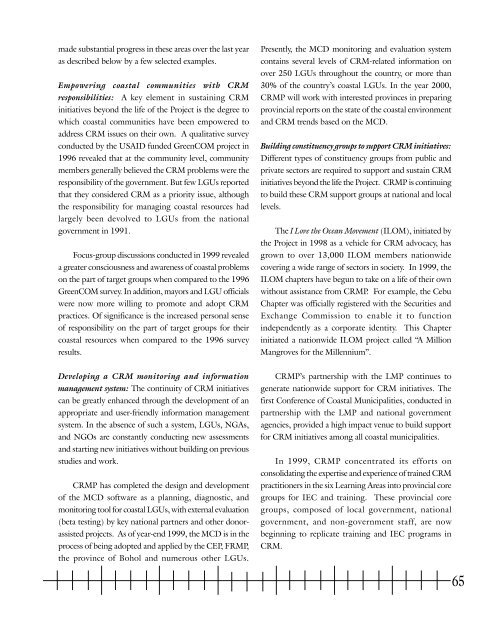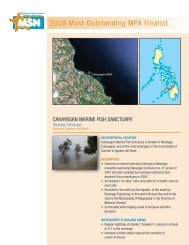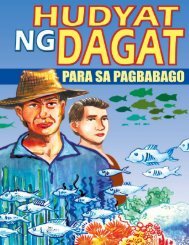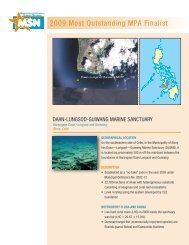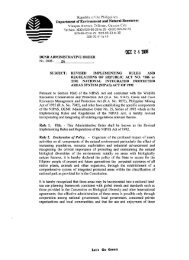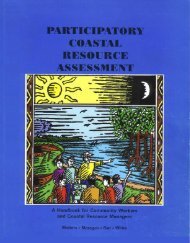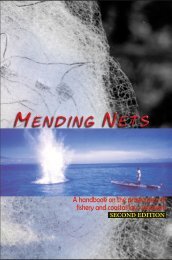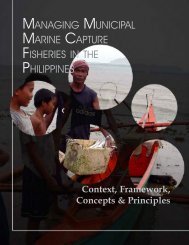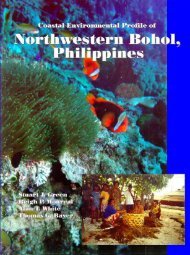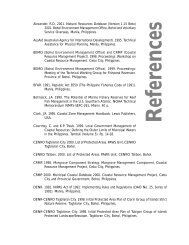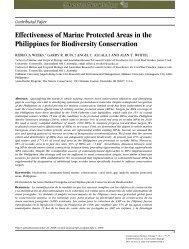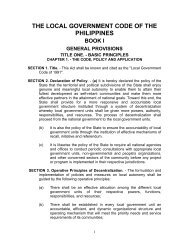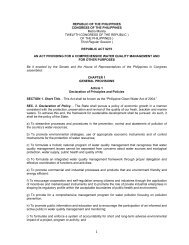Part 2 - Oneocean.org
Part 2 - Oneocean.org
Part 2 - Oneocean.org
- No tags were found...
You also want an ePaper? Increase the reach of your titles
YUMPU automatically turns print PDFs into web optimized ePapers that Google loves.
made substantial progress in these areas over the last yearas described below by a few selected examples.Empowering coastal communities with CRMresponsibilities: A key element in sustaining CRMinitiatives beyond the life of the Project is the degree towhich coastal communities have been empowered toaddress CRM issues on their own. A qualitative surveyconducted by the USAID funded GreenCOM project in1996 revealed that at the community level, communitymembers generally believed the CRM problems were theresponsibility of the government. But few LGUs reportedthat they considered CRM as a priority issue, althoughthe responsibility for managing coastal resources hadlargely been devolved to LGUs from the nationalgovernment in 1991.Focus-group discussions conducted in 1999 revealeda greater consciousness and awareness of coastal problemson the part of target groups when compared to the 1996GreenCOM survey. In addition, mayors and LGU officialswere now more willing to promote and adopt CRMpractices. Of significance is the increased personal senseof responsibility on the part of target groups for theircoastal resources when compared to the 1996 surveyresults.Presently, the MCD monitoring and evaluation systemcontains several levels of CRM-related information onover 250 LGUs throughout the country, or more than30% of the country’s coastal LGUs. In the year 2000,CRMP will work with interested provinces in preparingprovincial reports on the state of the coastal environmentand CRM trends based on the MCD.Building constituency groups to support CRM initiatives:Different types of constituency groups from public andprivate sectors are required to support and sustain CRMinitiatives beyond the life the Project. CRMP is continuingto build these CRM support groups at national and locallevels.The I Love the Ocean Movement (ILOM), initiated bythe Project in 1998 as a vehicle for CRM advocacy, hasgrown to over 13,000 ILOM members nationwidecovering a wide range of sectors in society. In 1999, theILOM chapters have begun to take on a life of their ownwithout assistance from CRMP. For example, the CebuChapter was officially registered with the Securities andExchange Commission to enable it to functionindependently as a corporate identity. This Chapterinitiated a nationwide ILOM project called “A MillionMangroves for the Millennium”.Developing a CRM monitoring and informationmanagement system: The continuity of CRM initiativescan be greatly enhanced through the development of anappropriate and user-friendly information managementsystem. In the absence of such a system, LGUs, NGAs,and NGOs are constantly conducting new assessmentsand starting new initiatives without building on previousstudies and work.CRMP has completed the design and developmentof the MCD software as a planning, diagnostic, andmonitoring tool for coastal LGUs, with external evaluation(beta testing) by key national partners and other donorassistedprojects. As of year-end 1999, the MCD is in theprocess of being adopted and applied by the CEP, FRMP,the province of Bohol and numerous other LGUs.CRMP’s partnership with the LMP continues togenerate nationwide support for CRM initiatives. Thefirst Conference of Coastal Municipalities, conducted inpartnership with the LMP and national governmentagencies, provided a high impact venue to build supportfor CRM initiatives among all coastal municipalities.In 1999, CRMP concentrated its efforts onconsolidating the expertise and experience of trained CRMpractitioners in the six Learning Areas into provincial coregroups for IEC and training. These provincial coregroups, composed of local government, nationalgovernment, and non-government staff, are nowbeginning to replicate training and IEC programs inCRM.65


